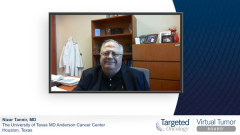
Clear Cell RCC and the KEYNOTE 564 Trial
Dr Nizar Tannir describes data presented at ASCO 2022 from EVEREST investigating everolimus vs placebo for patients with high-risk disease.
Episodes in this series

Nizar Tannir, MD: This is a summary of the results of the TKIs [tyrosine kinase inhibitors]. You touched on it, Scott. All the trials with a targeted agent were negative except the one that you pointed out: S-TRAC, which led to the approval of sunitinib. ASSURE is the cooperative group study. PROTECT was with pazopanib. ASSURE was sorafenib vs sunitinib vs placebo. ATLAS was axitinib vs placebo. The SORCE trial was 2 doses of sorafenib vs placebo. Then we’ll talk a little about EVEREST, the latest study that was presented at ASCO [American Society of Clinical Oncology annual meeting] 2022. I put it in red because it’s a negative study in my opinion, although it was teetering on—you can see the upper bound of it, 95% confidence interval being 1. But the hazard ratio is only 0.85. I’d like to get your thoughts on this. Let’s go through the data from KEYNOTE-564.
Here is [the phase 3 EVEREST study] presented by Chris Ryan, [MD,] at ASCO [in June]. It was 1 year of everolimus vs placebo. Fifty-five percent of the recruited patients had very high risk, defined here as pT3a, grade 3 or 4, or pT3b-c or T4, any T, any grade but node positive vs the intermediate-high risk. They used relapse-free survival and not disease-free survival [DFS], like most of these adjuvant trials. There was a 63% improvement in 6-year relapse-free survival. The overall hazard ratio was 0.85, which didn’t meet the prespecified P value. We’ll see what the FDA will say, but I don’t think this is going to be a factor in the adjuvant setting. Especially now that we have other trials with combinations of immune checkpoint inhibitors coming out. I’ll go through those slides to show all the adjuvant trials in the IO [immunotherapy] space.
These are the studies of adjuvant IO in RCC [renal cell carcinoma]. We’ll talk about KEYNOTE-564 in detail. We’re awaiting the results of IMmotion010, CheckMate-914, and RAMPART. There was a statement that PROSPER RCC was negative. The primary end point for most of these was DFS. For PROSPER RCC, it was event-free survival. PROSPER RCC was a little different from the others because it isn’t strictly an adjuvant IO therapy because patients had a biopsy with the primary tumor still in situ, started on nivolumab when the primary was still in place, then had the nephrectomy, and then received further adjuvant nivolumab. The RAMPART trial, which would be the latest to read out in a couple of years, is a triplet similar to CheckMate-914, which is a triplet of dual checkpoint blockade vs monotherapy with anti–PD-1 vs placebo. RAMPART has observation rather than placebo, which was the control arm in CheckMate-914.
Transcript edited for clarity.





















